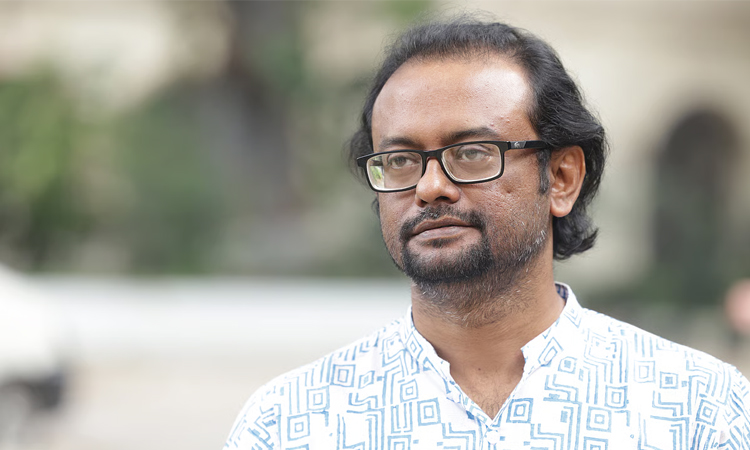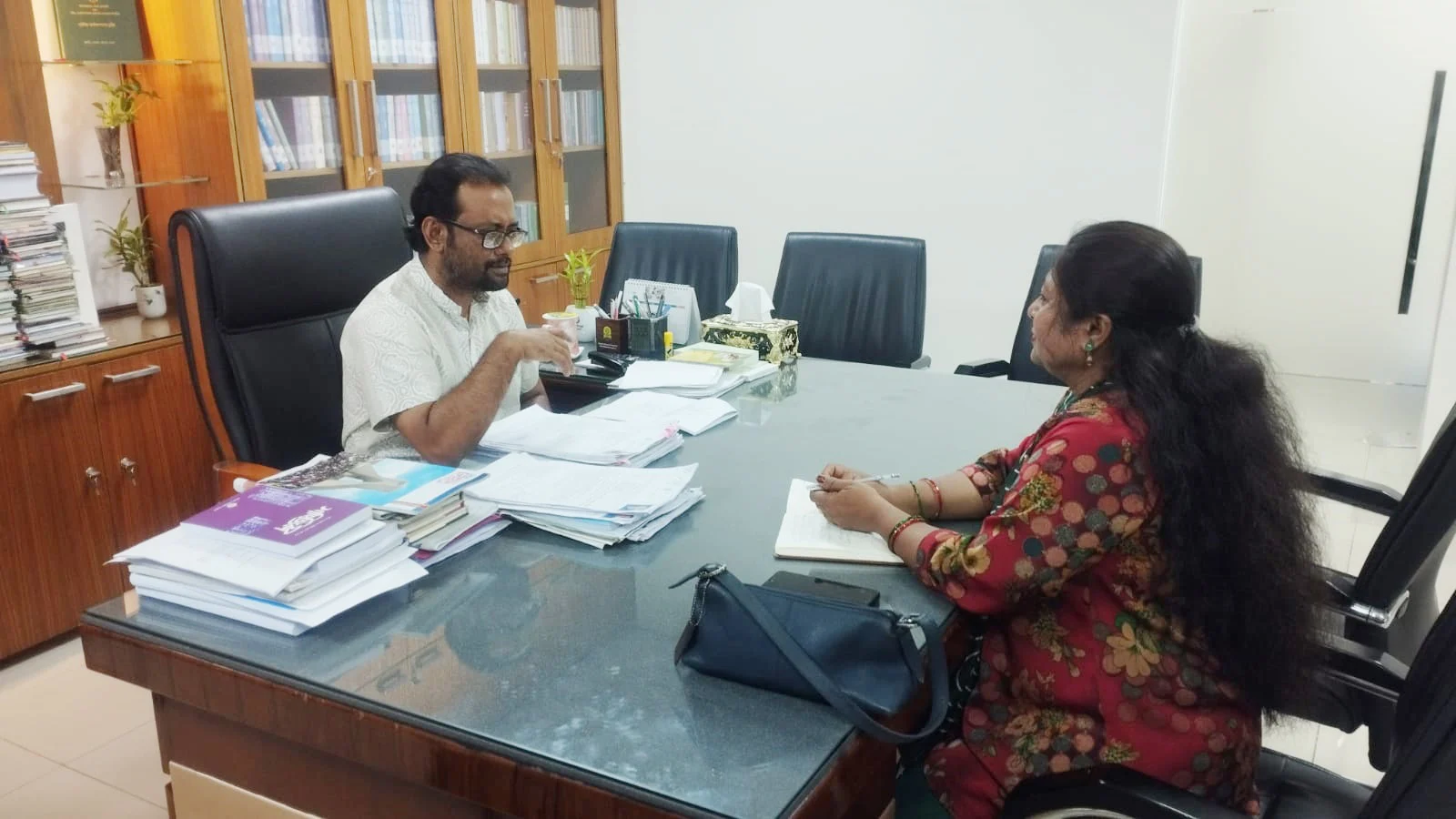News Flash

By Selina Sheuly
DHAKA, May 14, 2025 (BSS) - After the formation of the interim government, Prof Mohammad Azam of the Bangla Department of Dhaka University was appointed as the Director General of Bangla Academy for three years on September 5 last year.
Since then, he has been working tirelessly on future work plans, including taking and implementing various activities for qualitative changes and reforms, while upholding the history and tradition of the academy, with his own talent and thinking.
He recently spoke to Bangladesh Sangbad Sangstha (BSS) about these activities. Senior correspondent Selina Sheuly interviewed him.

BSS: You have been passing a very busy time as the Bangla Academy DG since joining. You are making various work plans, tell us something about this.
Director General: We are trying to improve the structural aspect of Bangla Academy a little. Bangla Academy is a very old institution. It has a history of 70 years. Various significant works have been done here at different times. Bangla Academy is at the center of the psyche of the people of this country.
BSS: You have taken the initiative to digitize Bangla Academy, how much progress has been made in this programme?
Director General: We have mainly tried to work with everyone, not individually, to improve the quality of Bangla Academy. We have already done some official works. There were job-related problems for many years, and work is also underway to solve those.
The major initiative that we have taken in terms of structure is to digitize the entire academy. The work of some parts should have been done earlier.
Surprisingly, Bangla Academy has been less digitized or in some places it can be said that it has not been digitized at all. We want to make Bangla Academy a completely digitalized one, for example, institutionalization, administration, finance, book publishing, book sales and other tasks.
In addition, work is underway to ensure that every aspect comes under the digitalized platform, including the introduction of biometric systems to ensure the presence of officials and employees.
In addition, we have already started working to ensure that the entire subject of the academy comes under digitalization. The goal is to print books in Unicode, so that they become e-books at the same time and are easily accessible all over the world. Along with this, we have also taken the initiative to create some apps. As a result, this is the biggest step in terms of structure so far.
BSS: What new initiatives have you taken regarding research at the academy?
Director General: Bangla Academy does not conduct research itself, it assigns others. We are trying to create an environment in which research can be done. There has been no significant research at Bangla Academy.
In this regard, we have started a new work. Not only at Bangla Academy, but for the first time in the entire country, we have given scholarships for researching 50 articles. Earlier, there were three annual scholarships of relatively small amount. Now, we have increased the number of these scholarships to 10 and the amount of honorarium has also been increased.
It was customary for the manuscripts submitted by writers to Bangla Academy to lie for 10-15 years. It had become a history of entanglement. Work has started to resolve these complications. We have taken initiatives to completely untangle this tangle by sending manuscripts submitted to the research department to other departments of the academy. Our goal is that after a manuscript is submitted to the Bangla Academy, it should be published in book form within a year. Or if the book is not published, the concerned author will be informed within three to six months.
BSS: In the past years, there had been some slowdown in publications from the Bangla Academy, why has this happened?
Director General: In the past years, important books have been published here. Sometimes, due to the pressure of additional publications for the 50th anniversary of Bangladesh and the birth centenary of Bangabandhu, the regular flow of publications and research books that used to be published slowed down and got stuck.
We are trying to overcome this. We have taken initiatives to write books ourselves by assigning translations, textbooks and other books. For which adequate budget and work plan are needed. Therefore, we are trying to get financial allocation from the government. In this regard, we are also encouraging foreign investment.
BSS: What are your plans for the journals published by Bangla Academy?
Director General: New initiatives have been taken to improve the quality of the journals published regularly by Bangla Academy. In this regard, the academy has sufficient allocation. There is manpower, so it is possible to make the best publications of Bangladesh. And a new decision has been taken. That is, an editorial board will be formed. The journals that will be printed will have Declaration Index (DI) numbers and will also have online copies and e-journals. As a result, we will be able to enter a new level through these journals. Hopefully, we will start these works as soon as our digitalization initiative gets progressed.
BSS: The Bangla Academy library is being arranged to be world-class, what changes have been made in its structure and renovation?
Director General: Plans have been taken to reorganize the Bangla Academy library to make it world-class. Two very important projects are now underway at Bangla Academy, one of which is library digitalization. The scope of the library has been expanded. As part of the library digitization, about 12.7 million pages have been scanned. Readers can read these pages directly here as well as online. Measures have also been taken to expand the overall services of the library worldwide. People from all over the world can read them as they wish.
People from all over the world will be able to take advantage of the Bangla Academy's library in their own way. This ongoing project will be completed in June. We will be able to provide this facility to the readers within the next six months.
In addition, a major project has been taken in collaboration with the Academy's Manuscripts Section. All manuscripts will be digitized there. Arrangements will also be made to preserve the new versions. From there, 5,000 pages of transliteration or transliteration (transliteration or transliteration is the conversion of some amount of text from one language script to another language script) and five large-scale edited books will be published. The project will see the light in the next two to three years.
BSS: For the first time, a 'writers' center' is being opened at Bangla Academy for poets, writers - tell us about this.
Director General: The writers' center at Bangla Academy will be inaugurated this month. Here, writers will be able to chat, and at the same time, they will be able to participate in various cultural activities including book cover unveilings, reading circles, poetry reading sessions, book discussions, etc. with the approval of the Bangla Academy authorities.
BSS: Tell us about your plans for the first-ever high-quality 'Littlemag Archive'.
Director General: There is a plan for the 'Littlemag Archive'. Two copies of each of the magazines published outside of formal institutional settings from different parts of the country will be deposited in this archive. Undoubtedly, this will be a big task.
BSS: Has there been any reform regarding increasing the number of membership in the Bangla Academy?
Director General: Everyone is interested in membership in the famous Bangla Academy. We have not given any membership this year. I hope that we will give membership to twenty-one people this year as per the existing rules. There are various proposals to increase the number of membership in the academy to twenty-one, fifty-two or seventy-one. Later, the number of members can be increased by the decision of the Academy and the Ministry of Cultural Affairs.
BSS: Are there any plans for next year's Amar Ekushey Book Fair?
Director General: There are definitely various plans for the next year's book fair. This year, Bangla Academy has been praised for working on everything including maintaining the dust, arranging the shops, building roads, and managing drinking water. However, many aspects of the book fair were not visible due to the inability to control hawkers. The non-cooperation from the law enforcement agencies was responsible for this. On the other hand, there was a lot of trouble with the sponsor. If the book fair is held with this setup next year and if I continue as the Director General of Bangla Academy, then I will be able to organize the Amar Ekushey Book Fair in a relatively organized manner.
If you look at the book fairs around the world, you will see that writers from all over the world gather there; at least a part of them gather offering an atmosphere of having a qualitative encounter or relationship between the publishers and readers. In the context of Bangladesh, if the Ekushey Book Fair, an esteemed annual event of readers and visitors, could bring together writers and readers from home and abroad, the fair would be livelier. Currently, our overall culture is not in favor. However, we will work to organize it in a perfect manner, which we could not do during the last book.
BSS: What other plans do you have for Bangla Academy regarding research?
Director General: The future plan for Bangla Academy is that the academy will be a reliable institution in publishing research books that are very rare and that outside publishers do not want to publish. More importantly, in the field of higher education, textbooks in Bengali - which our universities are supposed to publish, are not doing so for various reasons. For example, Bangla Academy can play the role of a partner in publishing textbooks, translations and research books.
In my opinion, Bangla Academy is an institution that facilitates practice, that is, creates facilities and opportunities. As a result, we have announced scholarships for research and essay writing. I have announced a scholarship for one year of research. I have received a huge response to this. More than 6,000 applications have been received against only 10 scholarships. The academy can do this on a large scale.
BSS: Tell me in detail about the work done with new writers.
Director General: The academy has conducted a 'writers' workshop' with young and new writers. It is done with a direct grant from the Ministry of Cultural Affairs. Those six-month and one-year programmes have received a response. Twenty writers' books will be published in this six-month programme. This year, work is underway to invite fellowships to publish 50 research articles. There will be only one condition for these research articles, they must be written in Bengali. Apart from this, the subject, area, age - everything is open. Researchers will receive an honorarium of Taka 20,000 for writing articles.
BSS: What other reforms are being made at Bangla Academy?
Director General: We are working to form a reform committee at Bangla Academy under the Ministry of Cultural Affairs. The Cultural Adviser has given instructions in this regard. There is a law of the Ministry of Culture and Bangla Academy regarding granting membership. The academy cannot take any decision in a hurry. If necessary, the number of members needs to be increased, and for this the law will have to be changed.
BSS: Burdwan House, a building from the British era, is the location of the Bangla Academy. Tell us something about the renovation of this house.
Director General: Burdwan House is a World Heritage building. Our office is on the third floor of this building. It is not possible to change and modify it on our own initiative. However, considering public safety, the damaged roof of the building was recently repaired and renovated on the advice of the PWD.
BSS: Thank you for giving BSS time.
Director General: Thank you.